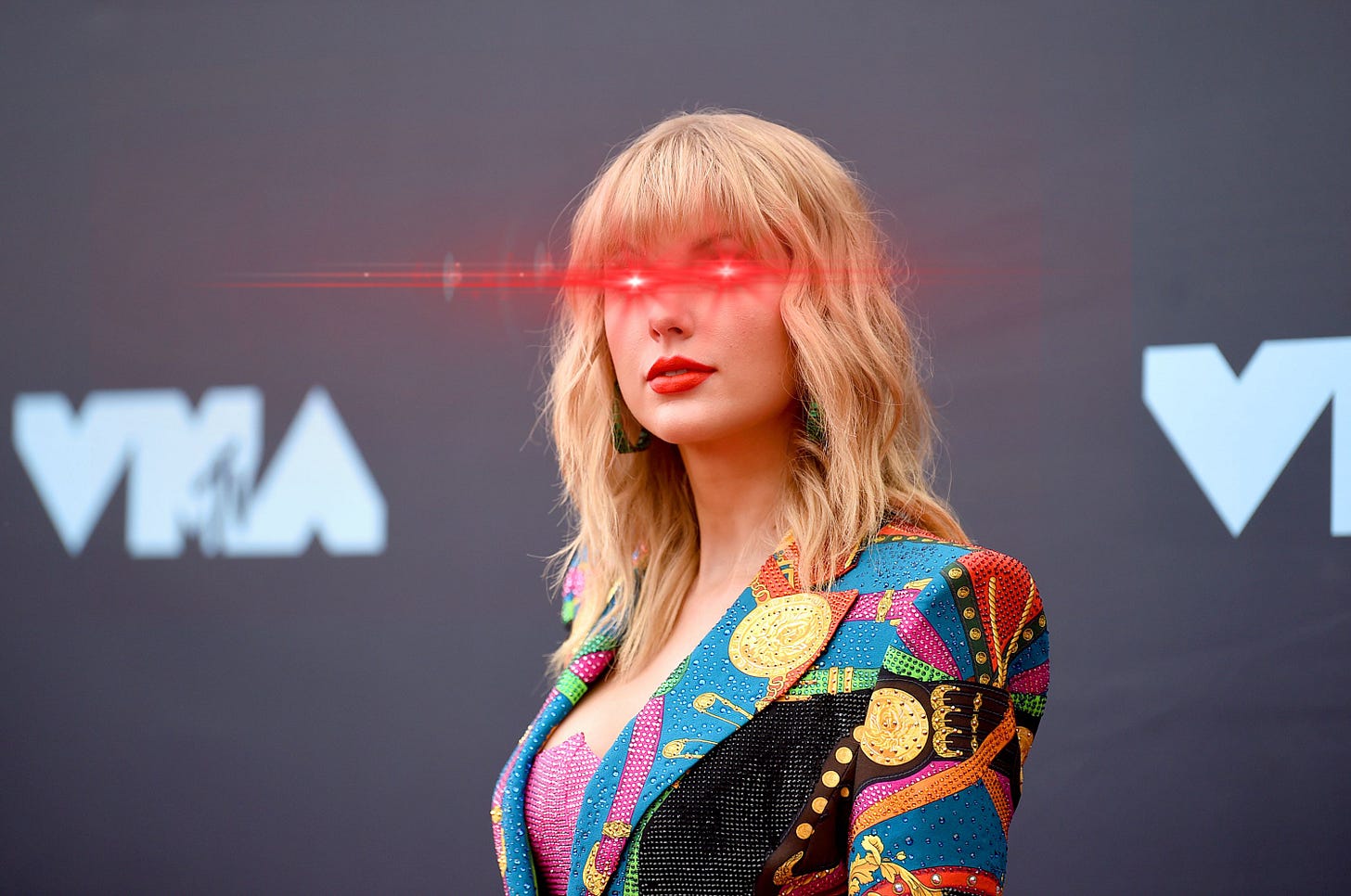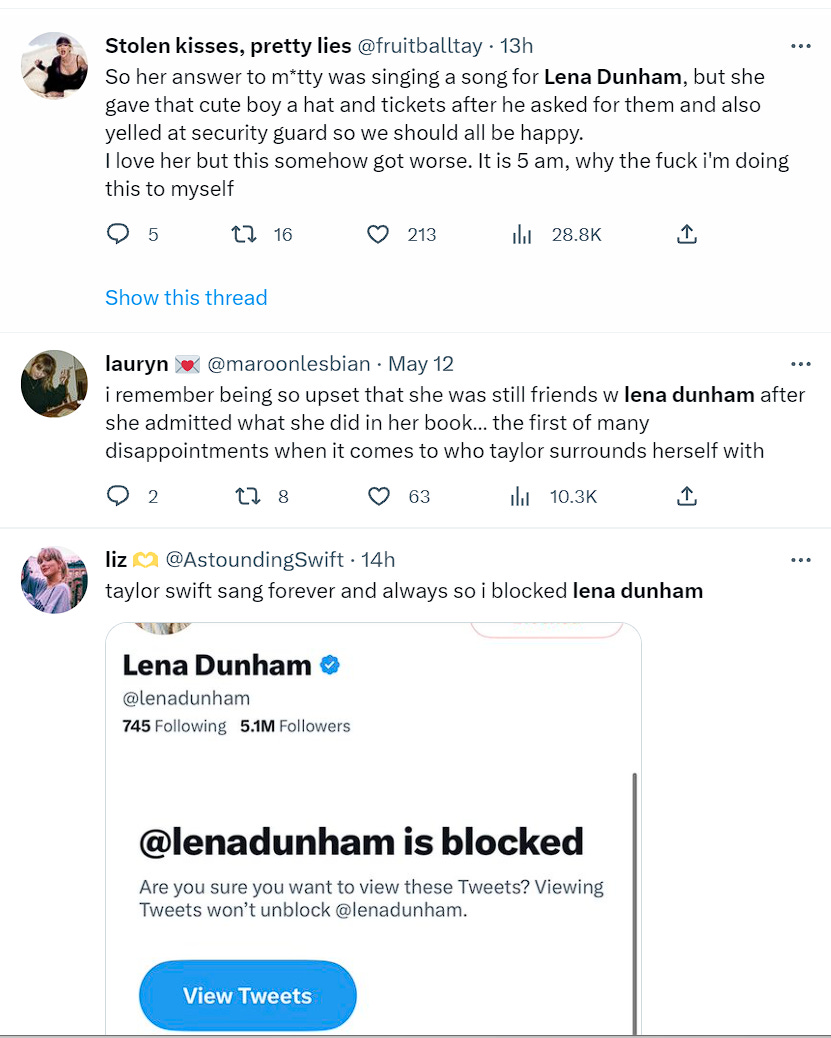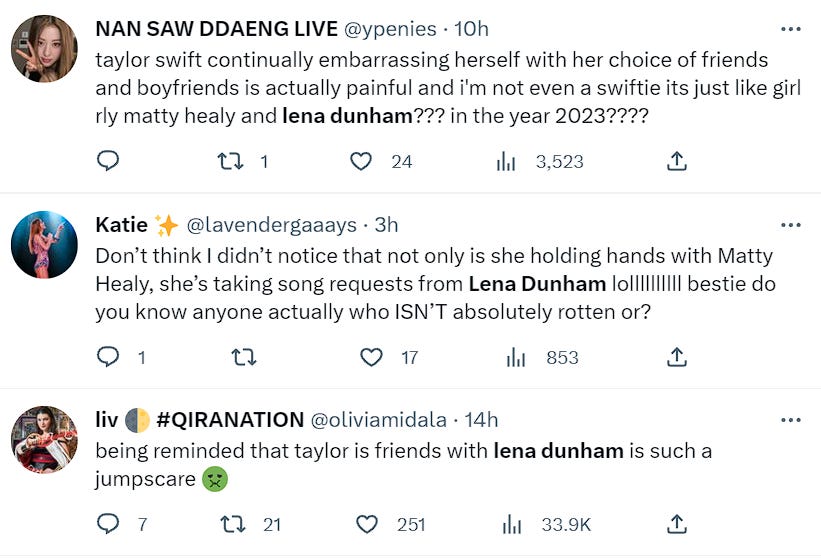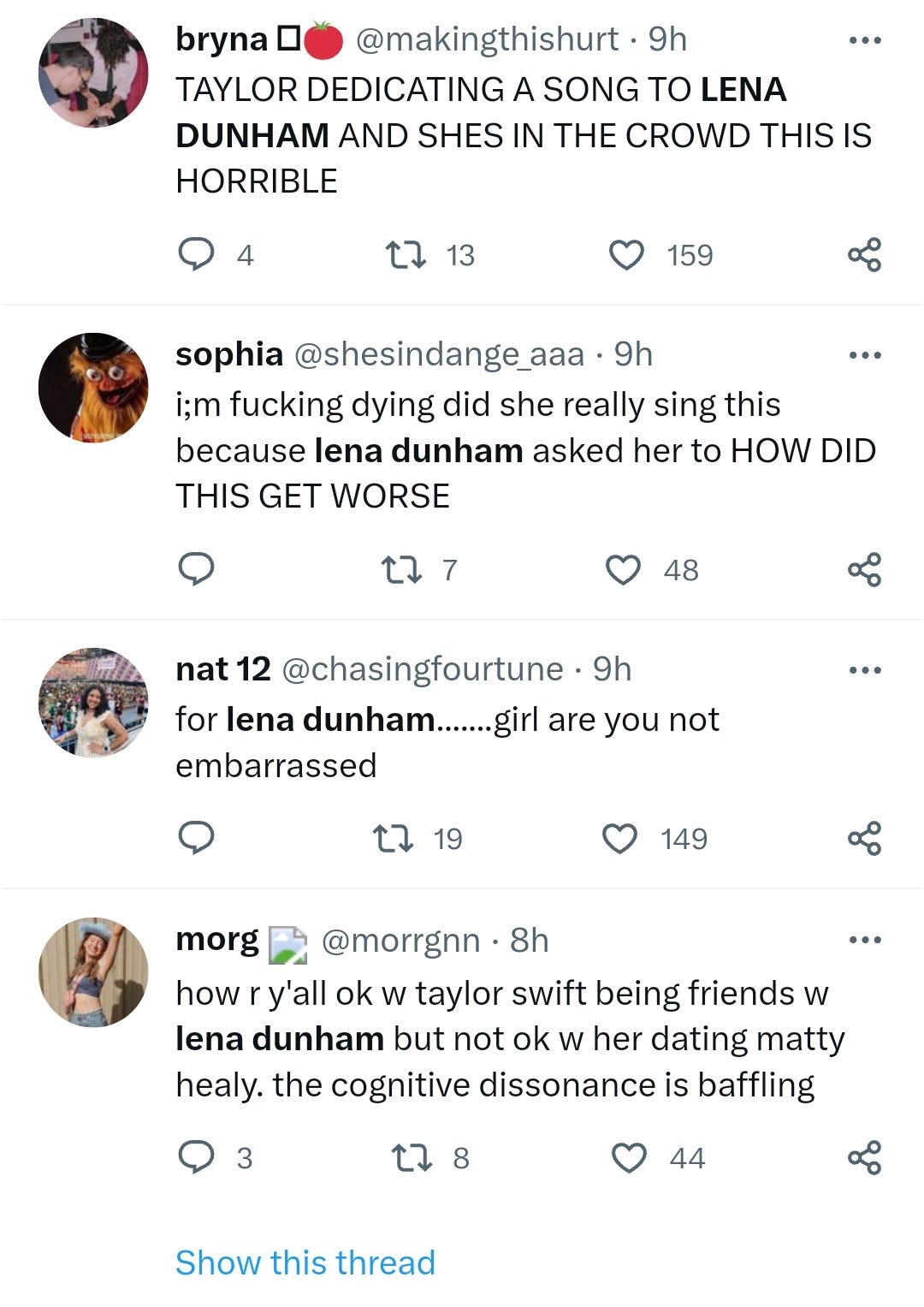The World Needs Taylor Swift Goblin Mode
Recently, Taylor Swift has been facing some heat from fans over persistent rumors that she’s dating Matt Healy, the lead singer of British group The 1975. I know nothing about any of this - I think I can name a single song by the 1975 and maybe five by Swift - but it strikes me as a sign of our parasocial times, when fans have such a massive sense of entitlement that they think they can dictate to an adult who she can and can’t date, entitlement driven by the understandable but false sense that they in some sense share a personal relationship with her. Of course, as is so often the case, these fans have leveraged quasi-political complaints to do so - Healy apparently has said some offensive things in the past, though what’s considered offensive is now so loose that it’s always hard for me to tell how legitimate these claims are. Well, I’m afraid it’s not enough for fans to vet who Swift takes as a boyfriend, they’re now also picking her friends for her.
I want to stake a basic claim here, first, in saying that totally leaving aside the politics behind the condemnation of Healy and Lena Dunham, this is fucking nuts. None of these people know Taylor Swift. None of them are likely to ever meet her, and if they do they almost certainly will have a 30-second handshake-and-a-photo interaction. They know neither Healy nor Dunham well enough to make these character judgments of them, but that doesn’t really matter, given that it’s none of their business who Swift is involved with. The idea that the relationship between a celebrity and fans is one in which the latter get to dictate who the former associates with is a pathology of this era of zero boundaries. Were Swift the Dalai Llama or the Pope, an explicitly moralizing figure, then maybe the moral valence of her associations would be appropriate subject matter. But she isn’t so it’s not. And I would argue that outside of really intensely immoral actions, the common assumption that being a fan of someone is somehow an endorsement of them as a moral being is weird and disordered for everyone involved. Here’s the issue, which applies regardless of whether your left or right, Democrat or Republican: major celebrities have fan bases that number in the tens or hundreds of millions. By definition, the notion that it’s reasonable to insist that they please most or all of them is unworkable. It’s a standard no one can meet.
I am particularly struck by referring to Swift as “bestie.” I’m very well aware that the tweeter in question would say that this is just a joke, an ironic usage or whatever. But I actually think that a lot of these people, deep down, really and truly do believe that Taylor Swift is their best friend. Which is sad and toxic! And this goes both ways - it's sad and toxic when that misconception drives sales of merch and when it prompts fans to think they can dictate someone's personal life.
Now, if I was Taylor Swift - worth half a billion, got a dozen Grammys, celebrated as an icon, and now 33 years old - I would just tell angry fans to fuck off. I would just tell them directly to fuck off. I’d step up to the mic at a concert and say “I love my fans in general, but if you think you own me, fuck right off.” I might even have my PR people put out a press release that says “Dear fans, fuck off, love Taylor.” Because why not? She’s the kind of figure that’s always going to piss off her fanbase to some degree and for some reason no matter what she does. Nothing will ever be good enough. And how much would she really be losing if she did? Hundreds of thousands of people fight to pay $1200 for tickets to her concerts. Most of them don’t have the slightest clue who she dates or is friends with and don’t care. Even if she somehow alienates the most deranged 10% of her fanbase to the degree that they stop competing to buy tickets and stop streaming her songs, which I highly doubt would ever happen, is she even going to notice the financial hit? Wouldn’t the increased personal freedom be worth so much more?
To underline a point above: most fans just listen to the songs, watch the games, buy the movie tickets. Celebrities, and to an even greater degree entertainment companies, are far far too worried about offending the 10% most unhinged fans. (See: Star Wars.) They're just not that economically important.
It’s interesting that Lena Dunham has been pulled into this; she strikes me as someone who during her career has been perhaps too responsive to a public that will never accept her. Dunham, whose work I sometimes find annoying but who’s clearly bright and talented, just can’t win it seems, mocked by people in some cultural groups as entitled and too woke and by others as PROBLEMATIC and still others as a sexual predator. She’s a favorite punching bag for various different social tendencies out there. (Yes, I am aware of the controversial passages in her book, and they strike me as an example of harmless exploration of the body that young children sometimes take part in.) And so she’s exactly the kind of person who would benefit, in my opinion, from simply saying “fuck it” and refusing to apologize for anything short of running over a grandma with her car. Where’s the upside, when you can never please people? And if Dunham is an extreme case, her basic scenario isn’t that different from those of all manner of other public figures, who find themselves under the constant pressure of having to please a fickle and exacting public. I would tell them to kick rocks. They’re going to complain about you on Twitter no matter what you do! So you might as well just tell them to fuck off. It’s a profoundly freeing feeling, when you realize that you can please no one so you no longer have to try.
And look, this has nothing to do with not calling a celebrity an asshole if they're an asshole. Taylor Swift might be a huge asshole, I have no idea. The point is that the parasocial era prompts the worst behavior from fans and celebrities alike. It both enables bad celebrity behavior and makes unreasonable demands of them. If a celebrity comes to the restaurant where you work and treats the staff badly, blast them online if you want. If a celebrity demonstrates moral or political values that you disagree with, feel free to stop supporting them. The point is that a) a celebrity doing things you don't like can’t be a personal betrayal because you don't have a personal relationship with them, b) the only important tool you have to express disapproval with an athlete or artist is to no longer give them your attention and money, and c) they’re under no particular obligation to respond in the way you want if you do. The point isn't that you should have no feelings of approval or disapproval towards a celebrity but to recognize that they're never going to be forced to care beyond their bottom line, because they have no attachment to you whatsoever. If you think that feels unfair or hurtful, that’s only because our culture has nurtured this awful parasocial expectation that gave you that impression. It's better for us and them if we say to ourselves “I don't have to like anything a celebrity says or does, but they never owed me anything beyond what I paid for.” And if a celebrity becomes disliked enough that they suffer financially, so be it.
Celebrity entitlement and fan entitlement are two sides of the same coin - “we give you everything, so you give us everything.” The re-establishment of boundaries here could result in better behavior from both sides.
This isn’t just about personal freedom or establishing boundaries. I think the fan service era of popular culture has been really terrible. I absolutely detest when a television show or movie is obviously providing fan service, which is true of just about everything going on with Star Wars these days, for example. When I critiqued the last season of Stranger Things, I pointed out that it’s a show that’s totally hemmed itself in by constantly catering to the fans. I also hate it when I’m watching a show and see a shot that’s obviously been designed so that fans will make an animated gif out of it or clip it on TikTok. Good art, even (or especially) good pop art, never gives the fans everything that they want, which is like making food out of nothing but sugar. Good movies and TV shows and video games reach the highest heights when they’re able to do what the audience doesn’t want. Not gratuitously or out of spite, but out of artistic need. Growth for a musical artist arises from leading the fans away from what they’ve already fallen in love with. And the tendency to try to give the audience what it wants, all the time, is part and parcel with this world in which the boundaries between artist and audience have completely collapsed, and you have millions of people who think they’re entitled to get whatever they want out of creators in their work and their lives.
I think the only way out of this ugly moment is for celebrities and artists to take on a little risk and set more firm, explicit boundaries. Actors, musicians, and athletes have to be willing to say to TikTok, “thanks for the support, appreciate the hashtags, I'll always do my best to entertain, but you don’t know me, I don’t work for you, I’m going to do what I want in my life and my art, and you’re either going to come along for the ride or you aren’t.” (Influencers and game streamers and YouTubers probably can't afford to do that, which is just another way those cultures are unhealthy.) And fans should recapture a little perspective and sense of distance, which will make the relationship more transactional and healthier. Because it’s always a transaction, between fans and creators. It’s not real love.
I'm as tired of “cancel culture vs. anti-cancel culture” discourse as everyone else. What we need is not the victory of one side over another in those tired binaries but an evolution past them. The deepest question about “cancel culture” doesn’t have an inherent political valence at all. That is, the debate frames support for public shaming as a progressive/left phenomenon and opposition to public shaming as a conservative/right phenomenon. But at the core of all of this is the fundamentally non-ideological issue of personal behavior, social control, and what’s reasonably asked of all of us, public figures especially. What’s a fair set of expectations for the larger crowd to have about their influence over the people who they celebrate for excellence in art and athletics? Today’s debates about public shaming are defined as a matter of liberals and lefties demanding that people in public life adhere to their personal moral codes, but in the past the shaming has come from the other direction, such as in the censorship of heavy metal and rap music. And I can’t be the only one to think that we’ve developed a culture that’s simply far too judgmental of everyone, all the time, and worse an everpresent mob that expects prominent figures to bend the knee. That’s got nothing to do with opposition to racism or sensitivity to sexual misconduct. It has to do with the desire to live as free and autonomous beings. In a democracy you get to participate in directing the government. Nobody ever told you that you get everything you want, especially when it comes to the conduct and associations of other adults.
The internet was a curio for most people in 1995. Twenty years later, six out of ten Americans carried it around with them in their pockets. It was inevitable that technological changes would outpace the cultural evolution necessary to absorb them. And I think this era of constant online screaming has been a byproduct of that discordant evolution of technology and social norms. With the decline of Facebook and Twitter, there’s been a lot of talk about pulling back from universal and open social networks and towards small, gated communities that share basic values and actually want to be together. I think that’s a great development and hope it continues. I also think that it’s far past the point that we all recognize that fan culture is toxic and broken, that it’s bad for fans and celebrities alike, and that we badly need a recalibration. Someone has to tell these delusional people: you are not the shit you like. Buy the concert tickets. Watch the game on TV. Go to the movie. And if you don’t like someone, don’t support their work with your dollars, ears, or eyeballs. But get a fucking grip. Integrity is the business of friends, and you aren’t friends with Taylor Swift or Lena Dunham or any of the rest of them. They don’t that know you (or I) exist, and they never will.
lol







More on topic, I was just talking to a friend about how strange it is that our culture seems to push everyone to try to be at least mini-celebrities. You're expected to live your life publicly, and it changes the way you approach everything you do - instead of experiencing your life, you're more like a director, framing and contextualizing shots and text in real time to create an illusory persona for others to interact with. The ultimate dream is that you can gain a large following of people interested in your constructed persona.
It's like Erving Goffman gone off the rails - while there's an element of performance in all human interaction, now there is an element of mass performance in all human interactions. And it's turned real relationships into fandoms and fandoms into bizarre parasocial monstrosities.
I felt like a similar dynamic played out with the recent John Mulaney special. Mulaney wasn't just a comedian that had a drug problem, which led to the dissolution of his marriage. He was a Wife Guy who had committed a moral crime against his fans. I was just blown away by how many people would name-drop his ex-wife's name in comments or reviews. What the hell? Was the special funny or not? I don't care how bad you feel for his ex. Way too many people were personally invested in a marriage that was none of their business.